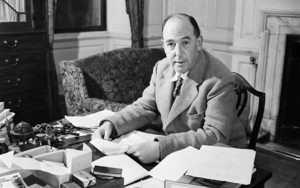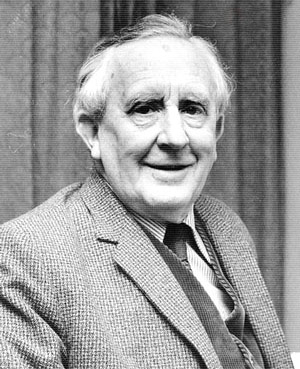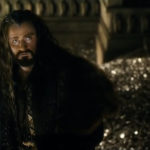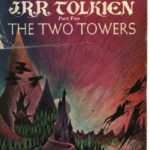Beyond Inklings Imitations 1: Exploring The Source
C. S. Lewis and J. R. R. Tolkien (and to a lesser extent Charles Williams, G. K. Chesterton, and Dorothy Sayers) are rightly celebrated by Christian readers and writers alike, well beyond the 50-year mark of their works’ first publication, for the quality of their fiction.

J. R. R. Tolkien
Their work broke like fire across a literary landscape that had despaired of again producing anything of mythic quality. Before these authors’ arrivals, global events had quickly dimmed the modern world’s expectation of tiptoeing to glory, and the heady philosophic predictions of the Enlightenment — that is, that rational sense had triumphed over ancient and medieval silliness and would wash across the globe, ushering in a secular Kingdom of universal peace and prosperity — were sorely tarnished. World Wars I and II quickly shut down such extravagant claims and threw the narrative of secularism out of balance.
Scholar Peter Leithart has helpfully summarized this shift. He wrote that ancient pagan literature was deeply tragic, medieval literature was deeply comic, and modern literature is deeply disappointed — a disappointment that modern man could no longer believe the deeply comic story of Christendom, and a further disappointment that their own secularized and bowdlerized version of it had so quickly soured.
Cynicism is the characteristic of modern (and postmodern) man. There are no more heroes, no more villains, for we all have our own agendas which all appear justified in our own eyes. After all, even the dragons have their reasons for rampaging and burninating the villages; such is their belief, one which we have no right to challenge.

C. S. Lewis
But into this disappointed, cynical, postmodern world stepped Narnia and Middle-earth, crafted by Lewis, Tolkien, as well the works of others who were officially (or colloquially) termed “The Inklings.” These fantastic worlds and their authors renewed our culture’s dimmed memories of heroes and villains, sinners and saints, good and evil. They reminded us of nobility and honor in a powerfully mythic way, a revitalizing wind that blew softly on the dwindling embers of Western Christendom. Their successes are well deserved.
This brings us, however, to an unfortunate problem.
Rebecca LuElla Miller has reminded us that Christian writers have often been stuck comparing their work to Lewis and Tolkien. “[This is] reminiscent of C.S. Lewis,” one endorsement said. Other blurbs say new stories are “in the tradition of Lewis and Tolkien.”
Why? Lewis and Tolkien tapped into a literary power — a power that gave their works mythic transcendence. Thus, these authors and endorsers want to tap into this same deep-rooted source of mythic power for themselves, or at least long enough for us to transact a purchase. So many a book has been adorned with some blurb or another proclaiming it the long-awaited work to rival the original Inklings that this itself has become a long-sought myth: that a newer work will finally meet the standard. It’s almost an eschatological expectation of Christian readers, anticipated as eagerly as the return of King Arthur.
Right.
Perhaps I’m skeptical, but I doubt an aspiring author could, even with ten years of work, produce something of similar or equal content to Lewis or Tolkien. Unlike even many great authors today, they benefited from living in an age when education was still designed to enrich the soul, not to merely download facts into a brain for the test. They were both literature and linguistic professors at Oxford (Oxford!), who lived and breathed the ancient and medieval myths. The fruit of their education fed the “compost heap” of their imaginations — imaginations that were fed repeatedly on the same stories for 40 or 50 years, decades before either of them produced their great fictional works.
We must ask, do even today’s great Christian speculative authors benefit from this background? Have they begun their story-crafting after this kind of training, this comprehensive education? Have they shared the same imagination cultivation, fed by mastery of languages, Biblical truth, and ancient mythology dating back centuries? If not, why claim one is the “next Inklings”?
Yet I’m not addressing authors here as much as readers. After all, the reason many authors are advertised as “the next Inkling” is because this approach sells. Why? We demand it. How do we demand it? By gobbling up any book that bears the “tradition of the Inklings” label.
It’s a huge circular feedback loop. Readers have so “cultified” the Inklings that authors and publishers assume the only novels Christian speculative genre readers want to read are imitations of Lewis or Tolkien. So they aim at producing something similar to Lewis and Tolkien. Naturally, many such works are merely derivative. Readers often can’t sort between the true “tradition of the Inklings” and its imitation, its pale counterfeit. How come? Because many readers (and authors and publishers) neglect what really gave the Inklings their strength.
How do we resolve this? By deepening our mission. Before we lament Inklings imitations from authors and publishers, we as readers must desire, and then demand, higher-caliber tales. There is no easy answer or “quick fix” that we all long for. A true return to this sort of thinking will take several generations. But we can begin that process of restoration.
1. Identify the Inklings’ true inspiration, beyond themselves.
Let us aim for the true target of Lewis and Tolkien. After all, the Inklings weren’t aiming for themselves. They sought stories like those of King Arthur, Shakespeare, Chaucer, Beowulf, Piers Ploughman, the Song of Roland, Sir Gawain and the Green Knight, and the greats of mythic and medieval literature.
2. Explore the Inklings’ views of Biblical truth, myth, and morality.
Lewis, Tolkien, and the other Inklings were Christian Medievalists, in the best sense of that word. They started not with their own world maps, created languages, and fairy-tale images, but with the belief that Scripture was the “true myth,” upon which all other myths are founded. Thus, to them, fantasy stories were not a foreign import from other cultures, used to help Christianity along. They were organic outgrowths of the True Myth.
Furthermore, these authors’ works were imbued with themes of honor, nobility, love, virtue, faith, because these old stories weren’t just stories to them. For example, Aragorn from The Lord of the Rings was noble because Tolkien had been shaped, down into his soul, to believe that nobility is important to be lived. This is not simply a “moral value,” as we like to say today. It is an older, ancient, God-exalting virtue.
3. Read, study, and be challenged by classic works that inspired the Inklings.
This will begin by our going back and reading these old works. Find them available free online, via library, e-book, or Project Gutenberg. Purchase good readers’ guides to the classics. There are many available. For parents, this may also include re-learning and returning to the sort of education in which Tolkien and Lewis thrived, and giving that to your children. But don’t be surprised when they surpass you easily in their love of “deeper” literature.
Yet for all readers, we must realize and expect that not every book must be like those of the Inklings. We’re not aiming for them. Instead we aim for the same goal as they. If readers do this, we may just find more work that genuinely deserves to be set on our shelves alongside Narnia, Middle-earth, and other fantasy classics.








































